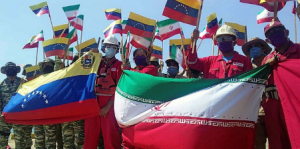 In a stunning display of solidarity and courage, Iran has successfully dispatched five Iranian-flagged tankers loaded with petrol to Venezuela, asserting the legal right of the two countries to trade with whomever they wish and breaking the criminal blockade imposed by US imperialism. From the moment the tankers set out from Iran in mid-May, Iran made no secret of their intended destination, openly challenging the supposed right of the US to dictate who should trade with whom, and facing down the piratical threats and bluster with which the US seeks to bully and intimidate sovereign nations into compliance with its demands.
In a stunning display of solidarity and courage, Iran has successfully dispatched five Iranian-flagged tankers loaded with petrol to Venezuela, asserting the legal right of the two countries to trade with whomever they wish and breaking the criminal blockade imposed by US imperialism. From the moment the tankers set out from Iran in mid-May, Iran made no secret of their intended destination, openly challenging the supposed right of the US to dictate who should trade with whom, and facing down the piratical threats and bluster with which the US seeks to bully and intimidate sovereign nations into compliance with its demands.
Iran and Venezuela have a formidable record of mutual support in the face of imperialist aggression. Back in 2009 the situation was reversed, when Hugo Chávez supplied petrol to Iran, a brave act of solidarity in revenge for which then-president Obama levied sanctions against Venezuela’s state owned oil company PDVSA.
Ten years on and Iran is returning the favour. Venezuela’s problem now is that whilst the country has plenty of oil, US sanctions have starved the country of the wherewithal to refine it for use as fuel. Those sanctions obstruct Caracas from getting hold of spare parts with which to repair the refineries or the chemical additives necessary for turning crude oil into fuel.
It is estimated that the five tanker loads, which all safely docked at Venezuelan ports, brought enough fuel to supply the country for some fifty days, and Iran has made it clear that if Venezuela requests more it is happy to supply it.
Back in April the US indulged in provocative naval manoeuvres in the Caribbean, supposedly in furtherance of an anti-drug operation, but in reality to heighten the threat level against the legitimate government of Nicolás Maduro, a government which the US had failed to oust through its dirty tricks. Caracas noted that this was reminiscent of the naval buildup that preceded the invasion of Panama in 1989, and was a clear threat to the sovereignty and independence of Venezuela. Indeed, Trump had already specifically threatened Venezuela with a naval blockade.
So it surprised nobody when Iran’s friendly trade initiative in May was greeted by the US with warlike (if incoherent) words, with Trump exclaiming that “We’ve got it [Venezuela] surrounded, it’s surrounded at a level that nobody even knows but they know. We are watching to see what happens” (‘Trump claims to have Venezuela "surrounded" as Iranian tankers approach’, Lucas Koerner, Orinoco Tribune, 23 May 2020).
Given the prevailing warlike tone issuing from the White House, both trade partners took security precautions against possible acts of piracy. Iran’s minister of defence, Amir Hatami, warned the US that his country would respond firmly to attempts to prevent Persian oil tankers from sailing to Venezuela, declaring that “Iran will not tolerate obstacles [to its oil ships]. Both the United States and other countries know that we will not hesitate. If the obstacles continue or increase, Iran’s response will be forceful” (‘Iran promises the US a forceful response if it prevents oil tankers from entering Venezuela to alleviate gasoline shortages’, Orinoco Tribune, 21 May 2020).
Meanwhile Venezuela’s army and air force were getting well prepared for all eventualities. In the course of military drills on the island of La Orchila, missiles were tested in readiness for any US attack on the tankers. Further, Venezuela’s defence minister, Vladimir Padrino López, explained that all the tankers, when they hit Venezuelan waters, would be “escorted by ships and planes of the Bolivarian National Armed Forces (FANB), to welcome them and say to the Iranian people: thank you for so much solidarity and cooperation!” (‘Venezuelan Army to Escort Iranian Tankers Bringing Gasoline to Venezuelans Blockaded by US Sanctions’, Orinoco Tribune, 20 May 2020).
The revolutionary spirit of both the Iranian and Venezuelan peoples stands as a beacon of hope for the oppressed masses of the whole world, and earns the unbounded respect and support of all anti-imperialists.
Comments are closed, but trackbacks and pingbacks are open.